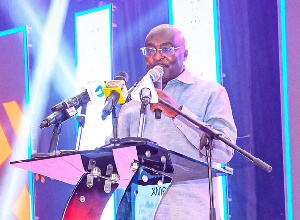Business News of Thursday, 4 July 2019
Source: thefinderonline.com
2 oil blocks taken: Negotiations set to begin
Two international oil exploration companies have been declared winners two oil blocks of the first licensing round of oil exploration.
First Exploration and Petroleum Development Company, in partnership with Elandel Energy (Ghana) Limited as local partner, won the bid for block GH_WB_02.
Similarly, Eni Ghana Exploration and Production Limited, in partnership with Vitol Upstream Tano Limited, emerged winner of block GH_WB_03.
A statement issued by Nana Oppong Damoah, Head of Communication and Public Relations of Ministry of Energy, said government has, therefore, invited the companies for negotiations on the terms of the petroleum agreement pursuant to Regulation 18 of the General Petroleum Regulations, 2018 L.I 2359.
The government, through the Energy Ministry, earmarked six oil blocks for exploration.
Three of the blocks – 2, 3 and 4 – were to go through competitive bidding process.
On the other hand, two blocks – 5 and 6 – were supposed to be for direct negotiations.
One of the blocks was reserved for Ghana National Petroleum Corporation (GNPC).
14 Oil and gas firms expressed interest
A total of 14 oil and gas firms expressed interest in the first licensing and bidding process for some oil blocks.
The original pool of companies that put in a bid for the three oil blocks include China National Offshore Oil Corporation (CNOOC), Cairn Energy, Qatar Petroleum, Global Petroleum Group, First E&P, Sasol, and Equinor and Harmony Oil and Gas Corporation.
The rest include ExxonMobil, British Petroleum, Tullow Ghana Limited, Total, ENI Ghana, Vitol, Kosmos Energy, and Aker Energy.
ExxonMobil, BP wanted blocks 5&6
US oil giant, ExxonMobil and British Petroleum (BP) submitted applications for direct negotiations for block five and six.
However, the two International Oil Companies (IOCs) pulled out from bidding for oil blocks at the last minute.
It is not clear yet why the two multinational companies decided to pull out at the last minute.
There was no bid for block 4. Interestingly, the ministry received about 16 applications for direct negotiations.
Low data quality concerns for oil companies
Speaking at a legislative review stakeholders’ meeting, Energy Minister John Peter Amewu said significant data gaps and low data quality were disincentives to attracting major oil giants in Ghana’s oil and gas bidding process.
According to him, the recent bidding process for some oil blocks in the Western Region has not been satisfactory because of challenges, including gaps in the legislative instruments, as well as low quality of data on the blocks.
He stated that Ghana’s basins are largely not de-risked because significant data gaps and low data quality still exist, and many companies continue to see fiscal regime as disincentives.
The recent results of Ghana’s first licensing round, although not satisfactory in terms of the response rate, has confirmed the fears about a developing industry and the risk associated with frontier areas, he added.
“It is clear to us that you have serious concerns about the legal, regulatory and fiscal environment governing the oil and gas industry. As a country, we also have concerns about the operations of industry players, and, therefore, our policies and regulations have been designed to maximise value for the country and our people,” Amewu said.
The non-existence of reliable data and low level of documentation on exploratory fields continue to have a negative impact on the quest by the government to bargain higher returns from global oil exploration companies.
The situation has compelled the Ministry of Energy to conduct a strategic legislative review for the oil and gas industry.
The review process began with stakeholders and industry players seeking to examine the government’s new policy to accelerate growth in the sector to help meet its target of one million barrels per day.











